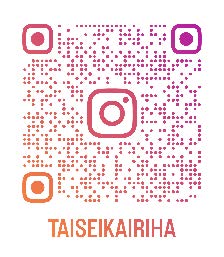Clinical Departments
Rehabilitation Department
Introduction of Rehabilitation Department
The Taiseikai Group, centering on Uchida Hospital and Taiseien, provides various rehabilitation services according to patients' requests and the nature and progress of their diseases.
Philosophy of the Rehabilitation Department
We provide rehabilitation so that people can live their lives as they like in the community.
Taiseikai-style rehabilitation
We provide high quality rehabilitation services.
We will continue to challenge and grow ahead of the times.
We recognize the diversity of "you" and approach you with compassion and a smile.
We provide the joy of living through multidisciplinary cooperation.
About the Daiseikai Group's Rehabilitation
The hospital provides disease-specific rehabilitation (Brain I, Movement I, and Call I) under the facility standards. By appropriately distributing staff to each floor and assigning floor leaders, the hospital promotes collaboration within the wards, leading to better understanding of patients' conditions, early intervention, and discharge from the hospital. At Daisei-en, individual rehabilitation (short-term intensive and dementia short-term intensive) is provided to in-patients and out-patients to train them to return home, prevent progression of dementia, and provide guidance for recovery. In addition, on-site rehabilitation by physical therapists, occupational therapists, and speech therapists can also be covered by medical insurance and long-term care insurance, depending on the condition.
Personnel (as of May 2025)
-Physical therapists (PT): 57
-Occupational therapists (OT): 24
Speech-language pathologist (ST): 6
-Dental Hygienists (DH): 10
-Music Therapist (MT): 3
-Health and fitness instructor (HFP): 2
-Authorized Clinical Artist (AT): 1
-Rehabilitation office and assistant: 4
Part-time physicians and lecturers
In addition to our staff, we invite part-time physicians and lecturers from various institutions to provide medical care and guidance.
| part-time physician | Dr. Masayuki Tazawa | Department of Rehabilitation Medicine, Gunma University Hospital The clinic is open every Friday. |
|---|---|---|
| Dr. Sakaguchi | Ryohoku Hospital Visits twice a month and makes feeding and swallowing rounds, Swallowing Contrast Angiography. |
| Part-time lecturer | Koukichi Asakawa, Physical Therapist | Professor, Tokyo Metropolitan University We visit the clinic twice a month for guidance. |
|---|---|---|
| Shigeya Tanaka, Physical Therapist | Lecturer, Takasaki University of Health and Welfare We visit the clinic twice a month for guidance. | |
| Kiyoshi Sakakibara, Physical Therapist | Lecturer, Gunma University of Health and Welfare We visit the hospital every other month to teach children. | |
| Kenshi Tsuchiya Occupational Therapist | Associate Professor, Nagano University of Health Sciences We visit the clinic twice a month for guidance. | |
| Hiromi Kitazume Occupational Therapist | Representative of ANOMIRA We visit the hospital every other month to teach children. | |
| Daiki Nagahara Speech Language Pathologist | Head of Department, Maebashi College of Health and Welfare We visit the clinic once a month for guidance. | |
| Masaaki Takano Speech-language pathologist | House of Hope Convalescent Hospital We visit the clinic once a month to provide pediatric guidance. | |
| Tetsuya Yamagami Physical Therapist | Professor, Gunma University We visit the hospital twice a month to provide special care and guidance. |
Rehabilitation
Prevention - Acute phase - Recovery phase - Maintenance phase - Terminal phase Geriatric rehabilitation, pediatric rehabilitation, care prevention, home support, community rehabilitation, etc.
Major Diseases
Cerebrovascular disease, fracture, spinal cord and spine disease, osteoarthritis, intractable disease, internal disease, dementia, disuse syndrome, motor instability, respiratory disease, developmental disorder, etc.
Therapies incorporated
The Taiseikai Group incorporates a variety of therapies.
Physical Therapy
Robot Suit HAL® (Hybrid Assistive Limb)
Developed by CYBERDYNE Corporation, HAL is the world's first cyborg-type robot that can improve, assist, expand, and regenerate physical functions. By wearing HAL on the body, human-machine-information can be fused to facilitate motor learning to the brain and nervous system, such as helping physically disabled people move and exert greater force than usual. We have introduced both lower limb type and waist type HALs, and actively utilize them in outpatient, inpatient, and geriatric healthcare facilities for people with cerebrovascular diseases, dementia, and various other diseases.
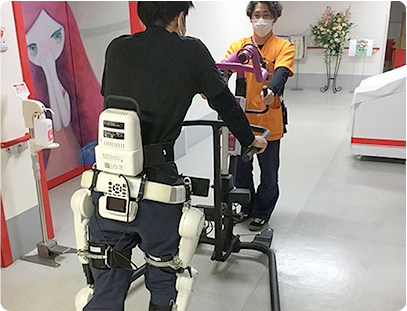
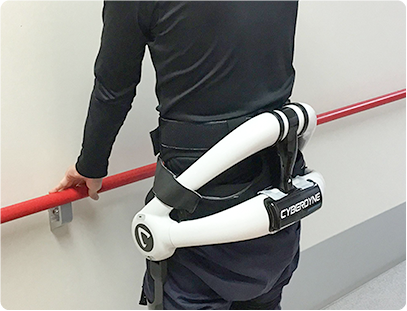
red code
This suspension exercise was born in Norway, an advanced rehabilitation country. It can be used for all people in diverse fields ranging from medical care and prevention to sports and performance improvement. It can be used for relaxation, muscle strengthening, balance exercises, stretching, etc., all with a single red cord. We use it mainly in the field of prevention.
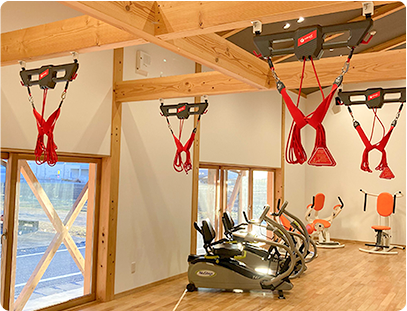
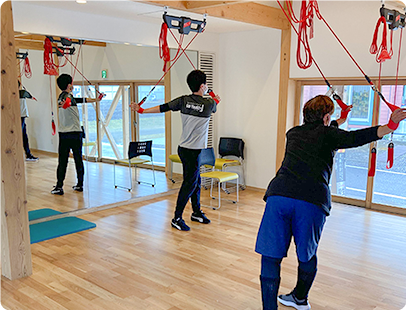
Art Therapy
What is very important when conducting therapy is that the participants are the main actors.
To ensure that you have an "extraordinary time and space," I start each visit with a handshake to greet you and take care to make you feel as if you are a special guest.
Above all, we remember to respect them as seniors in life. We are careful in our use of language and choice of topics during therapy, and we try to make it a time when participants can share their knowledge and experiences of seasonal events and customs in a centralized setting.
Some who had told us that they were not good at drawing and did not want to participate began to look forward to the therapy sessions, and began to have a sense of rhythm in their lives.
Since the start of art therapy, participants have been smiling, conversing, and living more vibrant lives.
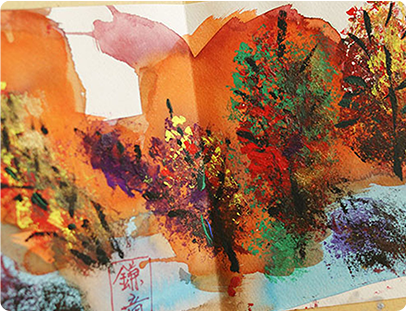
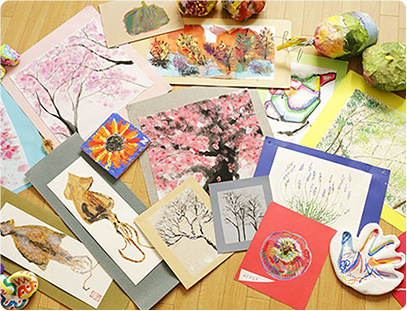
Music Therapy
Music therapy is a form of complementary medicine that seeks to restore physical and mental health through listening to and playing music. It can be effective for physical changes such as pulse, respiration, and blood pressure, as well as for the prevention of dementia, and can also provide an opportunity to interact with others.
Music Therapy Contents
| Uchida Hospital | |
|---|---|
| 1F: For outpatients | Music appreciation and live piano performance Every Wednesday and Friday 8:30-9:00 / 2F day room We invite you to listen to piano music during the waiting time before your morning examination. We play a variety of music from old songs to recent popular songs. Requests for music are also accepted. |
| 2F: For patients in the general ward | Group Music Therapy Every Tuesday from 3:00 p.m. to 3:45 p.m. / 2F day room Seasonal songs, favorite songs, playing musical instruments, singing exercises, reminiscing, etc. are performed. |
| 3F: For patients in recovery-phase rehabilitation wards | Group Music Therapy Every Friday from 14:45 to 15:30 / 3F day room Family members are also welcome to join in. They enjoy singing together with the patients. |
● Recollection
Reminiscence is a form of psychotherapy that activates the brain and stabilizes the mental state by looking at nostalgic objects and images from the past and discussing memories. It is believed to be effective in preventing the progression of dementia.
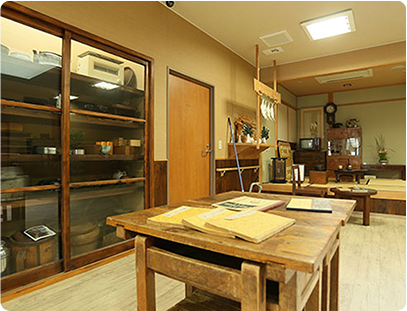
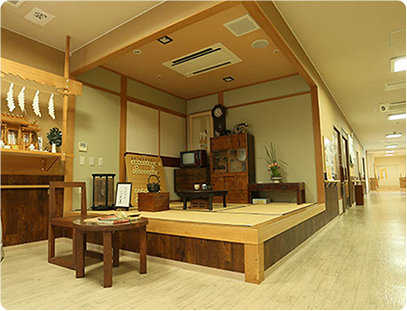
Cooking practice from field work
Many of us have worked in the fields as a job or hobby.
Doing a familiar task, feeling a sense of accomplishment in making something, and having someone else be pleased with what you have made will give the patient a sense of fulfillment and purpose in life. The program also provides movement evaluation, practice, and guidance in the field, harvesting vegetables and fruits for enjoyment, and cooking exercises using these vegetables, etc., which will help improve QOL as well as provide practice for life after discharge.
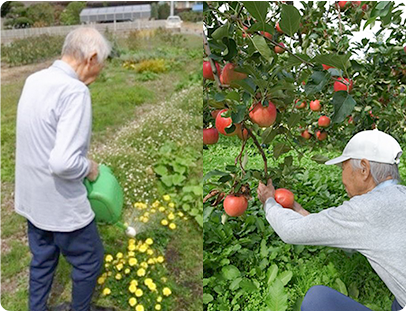
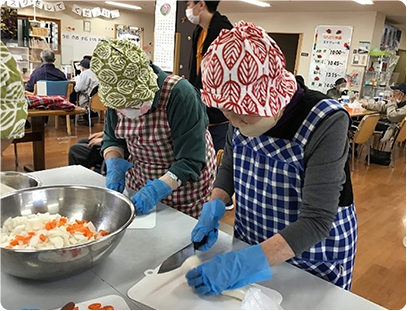
Oral rehabilitation
Dental hygienists, who are specialized dental staff, provide continuous oral care to those who are hospitalized or admitted to the hospital, and strive to maintain oral cleanliness at all times. We value "eating from the mouth" and provide oral rehabilitation and swallowing exercises.
Speech-language pathologists evaluate oral and swallowing function and provide oral swallowing training to ensure safe and delicious meals. Doctors, dentists, nurses, dietitians, speech-language pathologists, physical therapists, occupational therapists, and dental hygienists work together to conduct NST and meal rounds.
Driver Rehabilitation
Driver Rehab aims to provide comprehensive assistance to older adults and those with mild cognitive impairment (MCI) who are driving. For these people
(1) Assessment and training of higher brain function, cognitive function, and physical function
(2) Driving ability evaluation and driving advice using a driving simulator
(iii) Guidance and support for voluntary return
(4) Psychological support for return
(5) Assistance in using the long-term care insurance system and mobile sales
and others.
As you know, Gunma Prefecture has the highest driver's license holding rate in Japan, and Numata City is located in a mountainous area where many people make their living through agriculture, making driving a car an essential part of their lives. On the other hand, with the revision of the Road Traffic Law in March 2017, elderly people are now required to receive a checkup at a hospital according to the results of a cognitive function test when they renew their licenses. To support these people, we launched Driver Rehabilitation in October 2017.
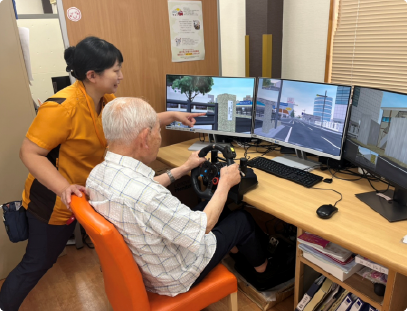
Such support is provided mainly through outpatient rehabilitation in the hospital department, but we also provide the same support in the long-term care insurance field in cooperation with the attached day-care rehabilitation facility.
The situation surrounding automobile driving for the elderly has become very challenging for them. Rather than a blanket view that "driving is dangerous because you are elderly," we believe that it is necessary to expand the system to provide support for those who can continue to drive safely, and for those who have difficulty driving, to support their return to driving and to assist them in their later lives.
● Pediatric rehabilitation - Helping children develop the ability to live in school and in the future.
Background of Pediatric Rehabilitation
In the Tone Numata area, there are few medical facilities where children can receive rehabilitation, and many of them had to travel to Maebashi or Takasaki City for rehabilitation over time. With the desire to bring rehabilitation to as many people as possible in this region, we started pediatric outpatient rehabilitation in January 2018. Currently, we provide individualized instruction to each child 1-4 times per month.
Target children
- Infants and toddlers with some delays in mental and physical development (developmentally disabled children, children with cerebral palsy, developmental delays, etc.)
- Children who are awkward in school learning and movement
- Children who are very particular and have difficulty interacting with friends and adults around them
- Children referred by nursery schools, schools, and infant health checkups
(People who have not been diagnosed at a specialized institution may also be eligible for rehabilitation. (Those who have not been diagnosed at a specialized institution may also be eligible for rehabilitation.)
Please feel free to contact us to discuss whether or not you are eligible for rehabilitation at our hospital.
Rehabilitation Contents
The goal of pediatric rehabilitation is to help children grow and develop in a healthy manner. We understand the developmental characteristics of each child and provide involvement that promotes motor, language, and social development through exercise and play experiences.
| physical therapy |
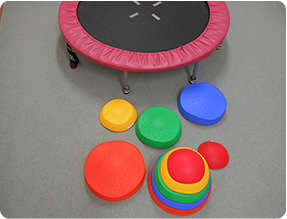
|
|---|---|
| occupational therapy |
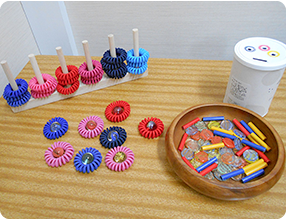
|
| speech-language pathology |
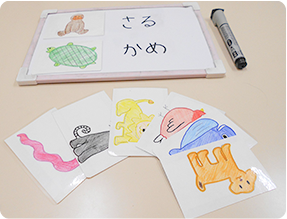
|
Rehabilitation Department Educational Philosophy
- To become human resources who are recognized by others, with a spirit of mutual trust and respect, a spirit of cooperation, and the ability to speak professionally.
- z To be a rehabilitation staff that understands the Daiseikai philosophy, provides rehabilitation based on it, and is continually chosen and needed by users and related parties.
training of new recruits
We provide new therapists with a mixture of preceptorship*1 and team-supported*2 education. New therapists are supported by a three-man cell consisting of a preceptor who is a third- or fourth-year therapist and an elder who is a fifth-year therapist or older. Our organization also employs a floor system where each profession works on a certain floor, and we also provide support through a multidisciplinary team.
In addition to corporate training for new recruits, training for new recruits is also provided within the Rehabilitation Department over the first year of employment.
In the second year and above, we utilize a ladder to support skill development.
We also actively provide assistance for qualification acquisition, support for participation in academic conferences and training, and scholarships for postgraduate study.
*1: A method in which a senior therapist (preceptor) with a predetermined experience is assigned to each newcomer on a one-on-one basis (working together on the same assignment) and is in charge of the newcomer for a certain period of time.
*2: A method in which a team educates and supports new therapists rather than assigning a specific instructor.
Regular 1-on-1 meetings are held so that psychological support can also be provided. We review our education system in response to changes in times and the organization*3 .
3 Tosei D, Hagiwara Y, et al; Examination of the educational system of the rehabilitation department based on a needs survey. Physiotherapy Education 4(2) 2_5 1_17 2024
Newcomer Training Schedule for FY2024 (PDF attached)
job rotation
In FY2023, we started job rotation for the purpose of building face-to-face relationships, proper placement, and promotion of inter-business cooperation, etc. We will visit each floor every three days to get a feel for the atmosphere and characteristics of each floor, which will be used as a reference for future careers and for inter-floor cooperation. In addition, floor assignments will be considered based on the actual sensations experienced*4.
Job rotations are offered to mid-career hires as needed. They become acquainted with the activities of our group, which operates many businesses. Mid-career hires often come to us with a clearer purpose, and we strive to support them.
4 Fujio, D., Yasuhara, C., et al.; An attempt of job rotation immediately after employment for newcomers in the rehabilitation department of a corporation with multiple projects. Physiotherapy Gunma(36), 12-21, 2025.
Licensed/Qualified Therapists (as of April 2025)
2 certified physical therapists (1 community physical therapy and 1 respiratory)
12 registered physical therapists
MISHOP Designated Manager Elementary (PT) 5
Association Designated Manager Senior (PT) 4
16 Community Care Council Promotion Leaders
12 care prevention promotion leaders
Manager for Frail Measures 4
2 certified occupational therapists
Lifestyle Improvement Management Certification: 1
5 practitioners of lifestyle improvement management
Japanese Society for Ingestion and Swallowing Rehabilitation 1
Clinical practice supervisors (PT, OT, ST) 34
2 certified respiratory therapists from 3 academic societies
Care managers 7
Certified psychologist 2
1 Specialist in dementia care
Welfare and Housing Environment Coordinator Level 2 4
1 Certified Day Care Master
1 health and exercise practice instructor
Doctor of Health Sciences 2
Conference Presentations
All Japan Hospital Association
Japan Society of Chronic Care Medicine
Japan Society of Chronic Rehabilitation Medicine
Association of Rehabilitation Units of Japan
The Japanese Society for Dementia Care
The Joint Society for Rehabilitation and Rehabilitative Care
Research Conference on Community Comprehensive Care Unit
Japan Robotics Rehabilitation and Care Research Conference, etc.
| Awards for academic excellence | |
|---|---|
| The 3rd Annual Conference on Chronic Rehabilitation (2016) |
Best Presentation Chia-aki Yasuhara, Physical Therapist "Verification of the Effectiveness of Rehabilitation for Patients with Dementia: From a Pilot Project" |
| The 4th Annual Conference on Chronic Rehabilitation (2017) |
Encouraging Subject Chia-aki Yasuhara, Physical Therapist Analysis of Dementia Patients in our Community Comprehensive Care Unit: Expectations for Dementia Rehabilitation" |
| The Japanese Society for Dementia Care (2018) |
Ishizaki Award Speech pathologist Nozomi Tomaru "The Dementia Care Study Group's Approach and Effectiveness Using Videos of Clinical Situations." |
| The 6th Annual Conference on Chronic Rehabilitation (2019) |
Encouraging lecture Naoto Okonogi, Physical Therapist Is the use of HAL appropriate for people with cognitive impairment? ~An Examination of Factors Related to Continuity of HAL Intervention in Our Hospital". |
| The Japanese Society for Dementia Care (2021) |
Ishizaki Prize - Physiotherapist Daiga Tosei The Effects of Positive Diary Keeping on Dementia Family Caregivers." |
| Gunma Occupational Therapists Association Newcomer case presentation (2023) |
Occupational therapists Tomohiro Shimada , Yuhi Hori , Yona Yoshizawa Newcomer's Best Presentation Award |
| Gunma Occupational Therapists Association Newcomer case presentation (2024) |
Occupational therapists Kotomi Inoue, Moeka Yamahora Newcomer's Best Presentation Award |
| Gunma The 31st Gunma Geriatric Health Care Facilities Convention (2024) |
Encouragement Award Yuna Kosuge, Physical Therapist "Never give up on returning to home: From 'direction and facility' to the home the person wants at the time of sending the petition." |
| Gunma Occupational Therapists Association Newcomer case presentation (2025) |
Occupational Therapist Miyu Amekai Newcomer's Best Presentation Award |

